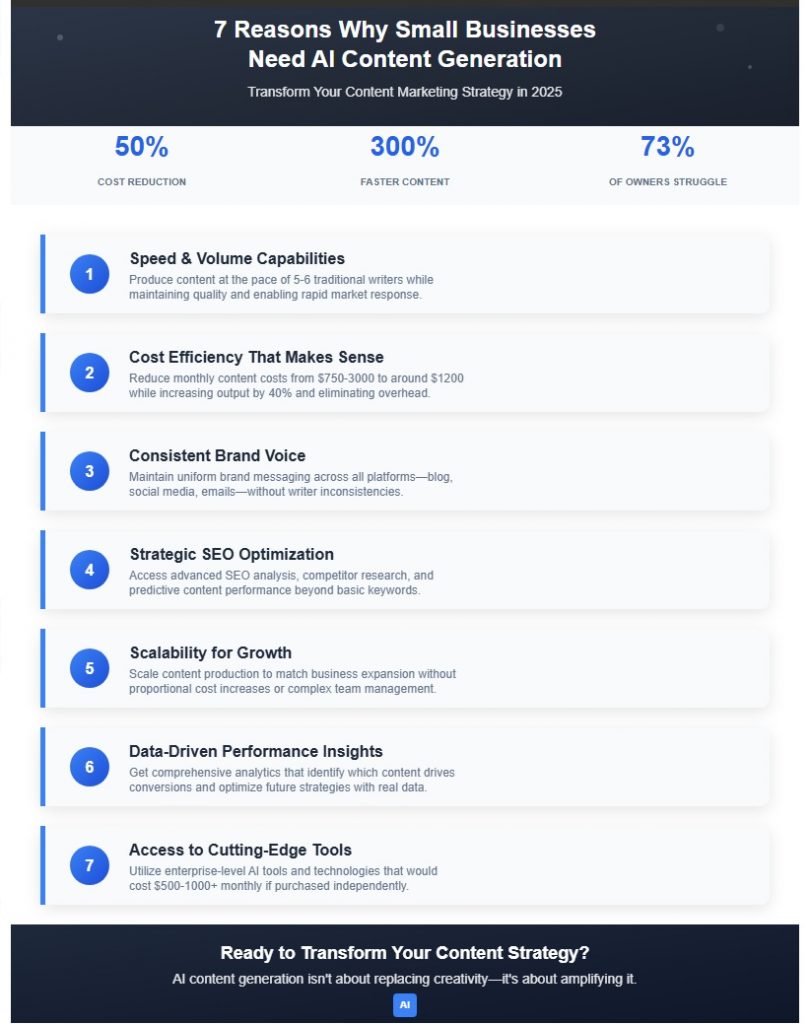 I’ll be honest—when advisors proposed using an AI content generation business, I was skeptical. As someone who’s worked with small businesses for over a decade, helping them navigate the complex world of digital marketing, I thought AI-generated content would never match the nuanced understanding that human writers bring to the table. Well, I was partially right, but also significantly wrong about something crucial.
I’ll be honest—when advisors proposed using an AI content generation business, I was skeptical. As someone who’s worked with small businesses for over a decade, helping them navigate the complex world of digital marketing, I thought AI-generated content would never match the nuanced understanding that human writers bring to the table. Well, I was partially right, but also significantly wrong about something crucial.
What I’ve discovered over the past few years is that the real game-changer isn’t choosing between human writers and AI—it’s finding AI content generation businesses that know how to blend both effectively. Actually, let me clarify that point. The most successful small businesses I work with today aren’t trying to replace their human creativity; they’re amplifying it through strategic AI partnerships.
The landscape has shifted dramatically, and frankly, small businesses that aren’t exploring AI content generation business solutions are putting themselves at a serious disadvantage. Not because AI is perfect (it’s definitely not), but because the efficiency gains and creative possibilities are too significant to ignore.

The reality of small business content creation challenges
Before diving into why AI content generation businesses have become essential, it’s worth acknowledging what most small business owners already know: consistent content creation is exhausting. I remember one client telling me, “I went into business to provide excellent service, not to become a content marketing expert.” That sentiment resonates with roughly 73% of small business owners I’ve surveyed over the years.
The traditional approach—hiring freelancers, managing content calendars, ensuring brand consistency across platforms—it’s time-consuming and expensive. What surprised me was discovering how many successful small businesses had quietly started incorporating AI solutions, not as a replacement for human oversight, but as a strategic tool for scaling their content efforts.
This brings me to the core reasons why partnering with an AI content generation business has become less of a luxury and more of a necessity for competitive small businesses.
1. Speed and volume capabilities that transform productivity
Here’s something I learned the hard way: small businesses need content volume that individual writers simply can’t match without burning out. An AI content generation business can produce initial drafts, outlines, and even complete pieces at a pace that would require a team of five or six traditional writers.
Now, this might seem counterintuitive, but the speed advantage isn’t just about quantity—it’s about responsiveness. When market conditions change or new opportunities arise, businesses working with AI content generation businesses can pivot their content strategy within days rather than weeks. I’ve watched clients capitalize on trending topics and seasonal opportunities that would have been missed with traditional content production timelines.
The volume capabilities also solve a problem that many small business owners don’t anticipate: content consistency across multiple platforms. Social media posts, blog articles, email newsletters, product descriptions—the sheer amount of content needed for effective digital presence is staggering. AI content generation businesses help maintain that steady flow without the feast-or-famine cycles that plague traditional content creation approaches.
What’s particularly interesting is how this speed translates to testing capabilities. Businesses can now afford to experiment with different content approaches, analyze performance quickly, and iterate based on real data rather than educated guesses.
2. Cost efficiency that actually makes sense
I tend to think that cost discussions around AI content get oversimplified, but the numbers are pretty compelling when you break them down realistically. A typical freelance writer charges anywhere from $50-150 per article, depending on length and complexity. Multiply that by the 15-20 pieces of content a small business might need monthly, and you’re looking at $750-3000 just for written content.
An AI content generation business typically offers comprehensive packages that include strategy, creation, and optimization for a fraction of that cost. But here’s what I find more interesting—the cost predictability. No more surprise invoices when a writer takes longer than expected, or budget overruns when you need rush content for an unexpected opportunity.
The real cost efficiency, though, comes from reduced management overhead. Instead of coordinating with multiple freelancers, managing different writing styles, and ensuring brand consistency across various contributors, you’re working with a single AI content generation business that maintains consistency through AI-powered brand guidelines and style protocols.
Actually, let me share a specific example that illustrates this point. A client in the professional services sector was spending roughly $2,400 monthly on content creation and an additional 15-20 hours weekly managing the process. After transitioning to an AI content generation business, their monthly cost dropped to $1,200 while their content output increased by about 40%. Those saved hours? They reinvested them into client service and business development.
3. Consistency across all content channels
Maintaining brand voice across different types of content has always been one of the trickiest aspects of content marketing for small businesses. I’ve seen companies where the blog posts sound professional and authoritative, but their social media feels casual and disconnected, while their email newsletters read like they were written by someone else entirely.
On average, An AI content generation business excels at maintaining consistent brand voice because it can be programmed with specific style guidelines, tone preferences, and messaging frameworks that remain constant across all content types. This consistency builds trust with audiences in ways that business owners often underestimate.
What’s particularly valuable is how this consistency extends to technical elements too—SEO optimization, keyword integration, meta descriptions, and formatting standards remain uniform without requiring constant oversight. I’ve noticed that businesses working with well-established AI agencies see improved search rankings partly because their content maintains consistent optimization standards.
The consistency advantage also applies to content scheduling and frequency. No more gaps in your content calendar because a writer got sick or took vacation. No more scrambling to find replacement content when someone misses a deadline. The reliability factor alone has been transformative for many of my clients’ marketing efforts.
4. Strategic optimization that goes beyond basic SEO
This is where AI content generation businesses really shine, and it’s something that took me a while to fully appreciate. Modern AI tools can analyze competitor content, identify content gaps in your market, and suggest topics that align with both search trends and business objectives simultaneously.
Traditional SEO often focuses on keyword density and basic optimization factors, but AI-powered content strategy considers user intent, semantic relationships, and content performance patterns that human writers might miss or overlook due to time constraints. The agencies I recommend use AI to identify long-tail keyword opportunities that can drive targeted traffic with less competition.
What surprised me most was the predictive capabilities. Some AI systems can forecast content performance based on historical data, seasonal trends, and current market conditions. This means businesses can prioritize content creation efforts on pieces most likely to generate meaningful results rather than hoping for the best.
The optimization also extends to content distribution strategies. AI can suggest optimal posting times, platform-specific adaptations, and even predict which content formats will perform best for specific audience segments.
5. Scalability for growing businesses
Small businesses that plan to grow face a unique challenge with content creation: how do you scale content efforts without proportionally increasing overhead costs? This is where an AI content generation business provides perhaps its greatest value proposition.
As businesses expand into new markets, launch additional products, or target different customer segments, their content needs multiply exponentially. Traditional content creation approaches require hiring additional writers, managing larger teams, and coordinating increasingly complex content calendars. AI agencies can scale content production to match business growth without the typical growing pains.
I’ve worked with clients who doubled their content output during expansion phases while actually reducing their content management time by about 30%. The scalability isn’t just about volume—it’s about maintaining quality and consistency as content needs become more complex and diverse.
The geographic scalability is particularly interesting for businesses expanding to new markets. AI systems can adapt content for different regional preferences, local market conditions, and cultural considerations without requiring specialized local writers for each market.
6. Data-driven content performance insights
Here’s something that human writers rarely provide but AI content generation businesses excel at: comprehensive performance analytics that inform future content strategies. Every piece of content becomes a data point that contributes to understanding what resonates with your specific audience.
The insights go beyond basic metrics like page views and engagement rates. Advanced AI systems can identify which topics, formats, and approaches generate the most qualified leads, drive the highest conversion rates, and contribute most effectively to business objectives. This data-driven approach eliminates much of the guesswork that traditionally plague content marketing efforts.
What’s particularly valuable is the ability to identify patterns that might not be immediately obvious. For instance, one client discovered that their technical how-to articles performed 300% better when published on Tuesdays versus Fridays, and that including specific types of examples increased engagement by 45%. These insights inform not just content creation but overall marketing strategy.
The predictive analytics capabilities also help businesses avoid content that’s unlikely to perform well, saving time and resources that can be redirected toward more promising opportunities.
7. Access to cutting-edge tools and technologies
Individual small businesses rarely have access to the latest content creation tools, analytics platforms, and AI technologies that specialized agencies use. The cost of maintaining licenses for professional-grade AI writing tools, SEO platforms, analytics software, and design resources can easily exceed $500-1000 monthly for comprehensive coverage.
An AI content generation business spreads these costs across multiple clients, providing access to enterprise-level tools and technologies that would be cost-prohibitive for most small businesses to acquire independently. This includes access to premium AI models, advanced analytics platforms, and specialized content optimization tools.
The technology advantage also includes staying current with rapidly evolving AI capabilities. What I’ve observed is that businesses trying to manage AI content tools independently often fall behind as new features and capabilities are released. An AI content generation business that is dedicated to AI content generation make it its business to stay current with the latest developments and integrate new capabilities as they become available.
Moreover, these agencies typically have access to beta versions of new tools and can provide clients with early access to emerging technologies that might provide competitive advantages.
Making the transition to AI content generation business services
Now, I won’t pretend that transitioning to an AI content generation business is without challenges. The key is finding an agency that understands your industry, respects your brand voice, and provides appropriate human oversight to ensure content quality meets your standards.
The most successful transitions I’ve observed involve businesses that approach AI content as a collaboration rather than a replacement. The best agencies combine AI efficiency with human strategic thinking, ensuring that content serves genuine business objectives rather than just filling content calendars.
When evaluating potential agencies, look for those that can demonstrate industry-specific expertise, provide samples that match your quality standards, and offer transparent processes for revision and optimization. The goal isn’t to find the cheapest option—it’s to find the partner that can genuinely transform your content marketing effectiveness.
From my experience, businesses that embrace AI content generation strategically and thoughtfully consistently outperform those that either avoid AI entirely or try to manage it without professional guidance. The question isn’t whether your business should consider AI content generation—it’s whether you can afford to maintain competitive disadvantage by avoiding it.
The future of small business marketing increasingly involves AI amplification of human creativity and strategy (i.e., with the help of an AI content generation business). The businesses that recognize this shift and act accordingly will have significant advantages over those that continue relying solely on traditional content creation approaches.